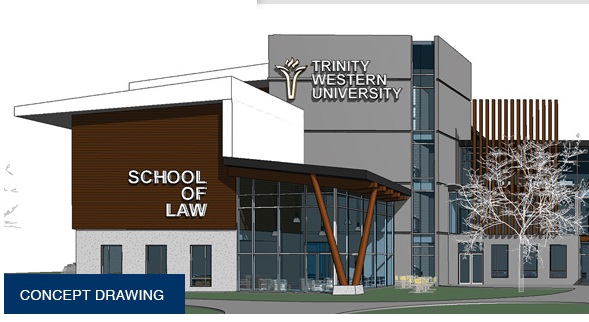VANCOUVER – A Christian university that requires students to abide by a so-called community covenant forbidding intimacy outside heterosexual marriage has been cleared by the Law Society of British Columbia to open its own law school, despite complaints that the covenant discriminates against gays and lesbians.

Trinity Western University, which has about 3,600 students at its Langley, B.C., campus southeast of Vancouver, applied to open a law school in 2016.
Gay rights advocates and members of the legal community had called on regulators and the B.C. government to reject the university’s proposal, pointing to a passage in the covenant that says students must abstain from “sexual intimacy that violates the sacredness of marriage between a man and a woman.” Students can face discipline for violating the covenant, either on or off campus.
The school already received preliminary approval from the Federation of Law Societies of Canada, and B.C.’s Advanced Education Ministry has approved the school to grant degrees.
Members of the Law Society of B.C. debated a motion Friday that could have overruled the federation’s approval, but they ultimately voted 20-6 to allow the school’s plans to proceed.
The debate over Trinity Western’s proposed law school fuelled a sensitive and emotional debate about how to balance the beliefs of a private Christian institution with the rights of gays and lesbians.
Trinity Western says it will be the first Christian university in Canada to open a law school.
The university’s president, Bob Kuhn, has accused critics of prejudice, telling the Nova Scotia Barristers’ Society earlier this year that nothing in the school’s policies would prevent students from acting professionally and ethically when they become lawyers.
Kuhn issued a statement Friday welcoming the law society’s vote in favour of the school.
“It (the decision) says that there is room in a democratic country like Canada for a law school at a Christian university,” the statement said.
At the law society meeting, Vancouver-based constitutional lawyer Joseph Arvay said the school was effectively putting up a sign at its doors telling gays and lesbians they are not welcome.
“What I fail to understand is how approving this law school in any way balances the rights of religious freedom and the rights of equality,” Arvay said
“TWU is requiring LGBT students and faculty, as a condition of entry, to hide their sexual orientation and to re-enter the closet.”
However, the majority of the speakers on Friday urged the law society to allow the school to proceed, even as some of them condemned the community covenant.
Criminal lawyer David Crossin said the school’s decision to press ahead without revising its covenant to respond to concerns about the document was discriminatory, hurtful and hypocritical.
Still, Crossin said the school’s behaviour isn’t enough to block the proposed law school.
“In my view, however, the law and the public interest demand recognition of TWU’s right to conduct their affairs in this way,” Crossin said.
“There is no evidence the ability of the teachers to properly teach will be compromised. There is no evidence the ability of the students to learn and think will be improperly stunted. There is no evidence the graduates will be unable or unwilling to properly serve the public and the administration of justice.”
Trinity Western says law societies in several provinces and territories, including Alberta, Saskatchewan, P.E.I., Newfoundland and Labrador, and Nunavut, have said they will allow students from Trinity Western to article in their provinces. Societies in Nova Scotia, Ontario, and New Brunswick are still debating the issue.
The school has faced debate over its Bible-based morality policies before.
In the late 1990s, the British Columbia College of Teachers blocked Trinity Western from granting teaching degrees over the very same issue. At the time, students were required to sign an agreement not to engage in activities that were “biblically condemned,” including “homosexual behaviour.”
The case went to the Supreme Court of Canada, which overturned the college’s decision and said the British Columbia College of Teachers failed to offer evidence that Trinity Western graduates would go on to discriminate against students in the classroom.


Comments